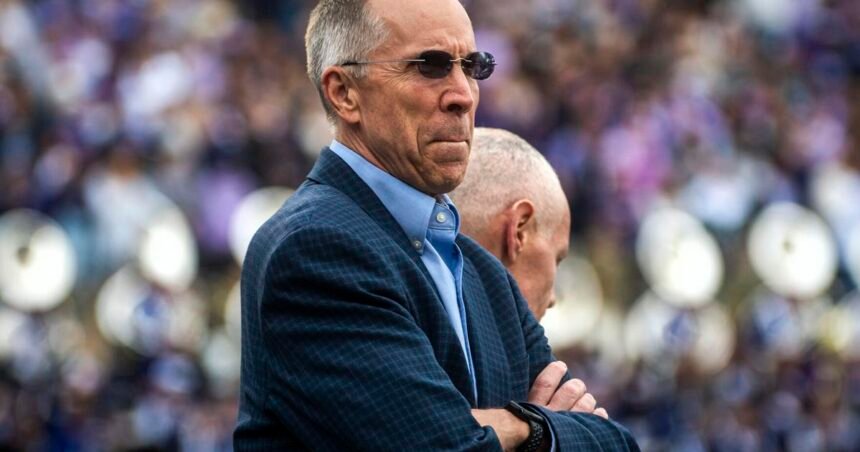The last few years have brought a wave of monumental changes to college sports, and Big 12 deputy commissioner Tim Weiser knows now is the time for him to step away.
Weiser, who previously was Kansas State’s athletics director from 2001 to 2008, will retire at the end of this year after helping the conference work through yet another round of realignment.
For the last 16 years, Weiser has overseen the day-to-day operations in the conference office, served as the primary liaison to the board of directors and handled sportsmanship issues. He has served under four Big 12 commissioners, watched six member institutions leave and ushered in 10 new schools to the conference, providing at least some administrative stability in a league regularly buffeted by upheavals.
But as the Big 12’s leaders turn their focus to the future, 66-year-old Weiser feels his perspective holds less value in the current era of the transfer portal and other player empowerment innovations.
“As it relates to our athletic directors, having been one for 25 years, I always felt like I was in a pretty good position to help them and also help our commissioner understand some of the issues they were up against,” Weiser told The Mercury. “But as things have started to evolve, I feel less and less equipped and able to advise them on how best to handle these issues because it’s just so counterintuitive to everything (I believed) for the first 35 years of my career.”
Weiser acknowledges he sounds “old-school,” but he said his understanding of college athletics always has been that players bring their talents to a school in exchange for a scholarship and a degree. In his opinion, that’s a “great deal.”
Now that athletes can make money off their names, images and likenesses, and with pay-for-play seeming more like an inevitability, Weiser said he’s noticed that conversations about graduation rates and the value of a scholarship have fallen by the wayside.
“It’s kind of heartbreaking to see where we stand now compared to even three years ago, let alone five or 10 years ago,” Weiser said. “But wow, it feels like we’ve got lots and lots of changes ahead of us.”
That’s why Weiser knows now is the time to get out.
He said he’s “grateful” for his time working with the Big 12. Still, he recognizes that his ability to counsel commissioner Brett Yormark and the conference’s athletics directors “has started to wane because I just can’t relate” to how the profession has altered.
An early experience when he was a 30-year-old first-time athletics director at Austin Peay has been instructive. Around that time, he was at a meeting with other ADs, and some veterans were bemoaning the fact that women now could compete in NCAA sports, a backward stance that astounded Weiser.
He wonders if his ideas strike younger people similarly.
“I’m guessing there’s probably going to be, somewhere down the line, somebody saying, ‘Gosh, can you believe those ADs back then thought all they needed to do was give these kids a full scholarship and not have to pay them anything?’” Weiser said. “I think it underscores how change is inevitable, and what disappoints me today probably is making others very happy and very excited about the new world and the future.”
This isn’t the first time Weiser has tried to retire. In summer 2023, he planned to announce he’d round out his full-time role with the conference at the end of that year, since UCF, Cincinnati, BYU and Houston had settled into the league. But then, the Big Ten made moves to add Pac-12 schools, and the Big 12 responded quickly, snatching up Utah, Colorado, Arizona and Arizona State.
Yormark asked Weiser to stay on another year to help with another transition, and Weiser said he was “glad to do it.”
“Tim has been a valuable associate,” Yormark said in a written statement. “He has been a tremendous resource for me. I am deeply indebted for the wisdom, guidance and knowledge he has provided me. I wish nothing but the best for him, (his wife) Susan and his family.”
Barring another round of realignment in the next few months, Weiser’s four-decade career in college athletics will come to a close — though he’ll remain a consultant with the Big 12 through December 2026.
Originally from Great Bend, Weiser played baseball at Emporia State, where he formulated his views about the trade of a scholarship in exchange for continuing an athletic career. After graduation, he went into academic counseling for student-athletes and then athletics fundraising.
He took his first athletics director position at Austin Peay in 1988, moving to Eastern Michigan in 1993 and Colorado State in 1998.
He became K-State’s 13th athletics director in 2001. During his time in Manhattan, the Wildcats won Big 12 championships in football, women’s basketball and volleyball in 2003-04, making K-State the first conference school to win three top-tier league titles in the same academic year.
Weiser also was responsible for two consequential coaching hires at K-State. First, there was Ron Prince, who took over the Wildcats football program from Bill Snyder following the 2005 season. And then, there was Bob Huggins, a somewhat controversial choice to lead the men’s basketball team after Jim Wooldridge’s firing in 2006.
Weiser said Prince’s disastrous three-year tenure at K-State — in which the Wildcats went 17-20 and became embroiled in off-the-field turmoil — was one of the “biggest disappointments” of his career, and a dispute between Weiser and university president Jon Wefald over extending Prince’s contract after the 2007 season was a factor in Weiser’s decision to leave for the Big 12 job in 2008.
Despite Huggins’ resignation from West Virginia following a drunken driving arrest last year, his one season at K-State rejuvenated a program that had fallen into mediocrity and a fanbase that had become indifferent.
“We had reached a point where our basketball fans and supporters had gotten comfortable with moral victories and close losses,” Weiser said. “As a kid growing up in Great Bend, that’s not how I remembered the Jack Hartman days and basketball being played. It felt, to me, like it was time for us to go all in.”
Initially, Weiser had no interest in Huggins, who had been forced to resign from Cincinnati in 2005 after another drunken driving arrest the previous year. But after a four-hour conversation in which Huggins took full responsibility for what happened at his last school, Weiser was convinced, saying the program “was at that point where we needed to take a lot of risk.”
While Huggins only stayed a year at K-State before moving on to West Virginia, his alma mater, he gave way to his assistant, Frank Martin, who kept up the program’s momentum.
“That disappointment (of Huggins leaving) was quickly offset with the excitement that Frank brought,” Weiser said. “Obviously, there have been other coaches. … Every coach has brought a different advantage to the university and to the basketball program. But I do think it’s hard to argue that Bob’s fingerprints weren’t on the success that Frank had. …
“It seems to me like if you look back, that was the point at which Kansas State basketball became relevant again.”
Even after Weiser’s advancement to the No. 2 position in the Big 12’s leadership, he always held K-State close to his heart. He reconciled with Wefald and has a good relationship with current athletics director Gene Taylor, about whom Weiser said, “From Day 1, he’s been a great fit. I think for places like Kansas State, that’s always going to matter.”
During the uncertainty of conference realignment, Weiser said he felt a “responsibility” to represent the interests of K-State and other similar Big 12 member schools. He said that reassured those universities, as they knew he would advocate their concerns to the league commissioner.
But now that the waters of realignment seem to have calmed, Weiser’s ready to hunt and spend more time with his two grown children and grandchildren. He plans to stay in the Dallas area for now, though he plans to get back to Kansas regularly. His son lives in Fort Worth, a stone’s throw from where Weiser currently is posted. His daughter lives in Virginia, and the constant flights out of Dallas/Fort Worth International Airport make it easy for him to visit.
In 40 years of work in college athletics, there are plenty of highlights for Weiser to look back on. Aside from helping the Big 12 survive and thrive the past decades and a half, he said the chance to “make a difference” in the lives of young people through sports has been one of his greatest joys.
If there’s one regret he has, it’s that he wasn’t able to finish his career at K-State.
“I’m never going to be anything but a K-State fan,” he said. “That’s always going to be true, and I’m always going to feel good about my time in Manhattan.”











